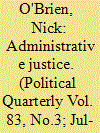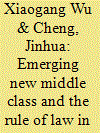| Srl | Item |
| 1 |
ID:
117486


|
|
|
|
|
| Publication |
2012.
|
| Summary/Abstract |
This article argues that the political significance of the Coalition government's proposed changes to administrative justice, including the abolition of the Administrative Justice and Tribunals Council, is in danger of passing unnoticed, despite its potential significance for the Big Society agenda. It suggests that the retrieval of genuine perspective lies in paying closer attention both to the contemporary importance of administrative justice and to the political debates of the 1950s and 1960s, which set opposing views of administrative justice in broadly libertarian and egalitarian contexts respectively. It concludes that the recovery in particular of an egalitarian account of administrative justice is necessary to animate, and rebalance, the debate. Administrative justice might then be perceived as an essential part of a broader political vision and a significant aspect of social justice more ambitiously conceived.
|
|
|
|
|
|
|
|
|
|
|
|
|
|
|
|
| 2 |
ID:
161667


|
|
|
|
|
| Summary/Abstract |
This article argues that Ken Loach's film, I, Daniel Blake, invites deep reflection on the relationship between the individual and the state, and, more particularly, on the role of administrative justice in restoring a re‐imagined sense of citizenship. Drawing on earlier debates from the 1950s, as well as on more recent advocacy of the ‘connected society’, the article proposes that to meet such an ambition, administrative justice must be recognised as an overarching set of principles and values, rooted in a framework of human rights and with a reinvigorated public‐sector ombud‐institution at its centre. In this way, administrative justice might serve as an effective and restorative counterweight to more legalistic options for responding to public grievance, whether the result of routine encounters with the state or of a major breakdown in trust, such as that occasioned by ‘Grenfell Tower’.
|
|
|
|
|
|
|
|
|
|
|
|
|
|
|
|
| 3 |
ID:
119237


|
|
|
| 4 |
ID:
138273


|
|
|
|
|
| Summary/Abstract |
The ombudsman institution, in both the public and private sectors, is increasingly identified with the ethos of consumerism and the protection of consumer rights. The current trend is exemplified and reinforced by the EU ADR Directive and by the government response to a recent inquiry into complaints conducted by the Public Administration Select Committee. This article argues that the dominant consumerist ethos diminishes the ability of the ombudsman institution to fulfil its potential. If the ombudsman institution, in particular as manifest in the office of the UK Parliamentary Ombudsman, is to serve the public interest, it must instead promote human rights principles and constitutional morality, adopt a process that is marked by public reasoning and participation and seek by a whole-system approach to realise a vision that is integrated and truly democratic.
|
|
|
|
|
|
|
|
|
|
|
|
|
|
|
|